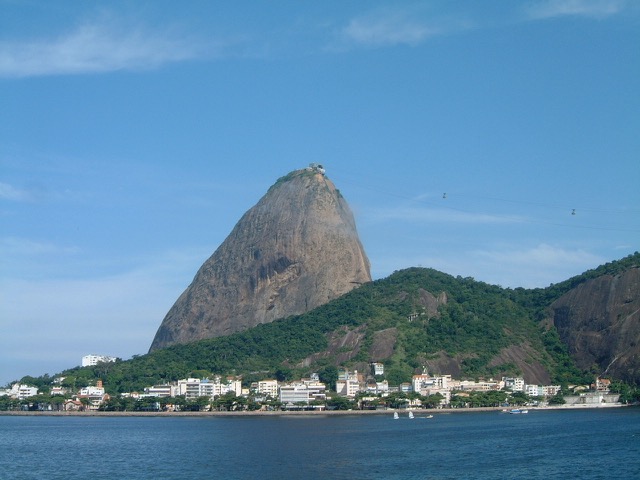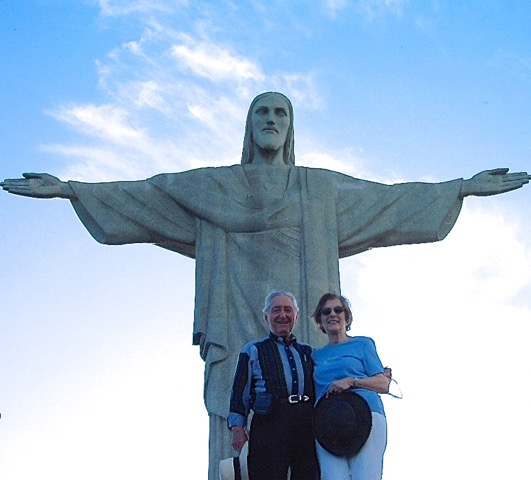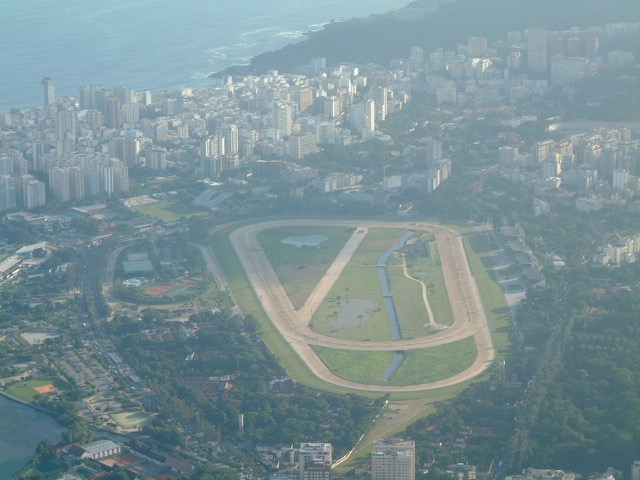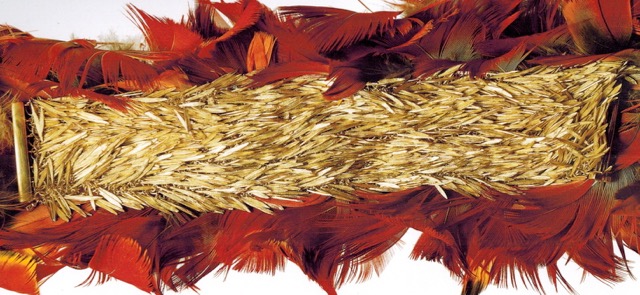BY JANET STEINBERG
RIO
DE JANEIRO…”River of January”…Like a sensual woman, the mere
mention of her name connotes romance and excitement. Before you even
arrive you will feel her anticipatory magic under your skin.
DE JANEIRO…”River of January”…Like a sensual woman, the mere
mention of her name connotes romance and excitement. Before you even
arrive you will feel her anticipatory magic under your skin.
The
breathtaking city of Rio de Janeiro was so named by the Portuguese who mistook
its island-dotted harbor for a river when they discovered it in January
1502. The city’s name may have been a mistake, but there is no mistaking
the aura of romance, adventure and youthful exuberance that leaves the city of
Rio unrivaled in all the world.
breathtaking city of Rio de Janeiro was so named by the Portuguese who mistook
its island-dotted harbor for a river when they discovered it in January
1502. The city’s name may have been a mistake, but there is no mistaking
the aura of romance, adventure and youthful exuberance that leaves the city of
Rio unrivaled in all the world.
Rio
de Janeiro. What remains to be said about a city of fantasy and
dreams? “God,” say the Brazilians, “made the world in six
days. On the seventh he made Rio.” Rio is unquestionably one
of the most beautiful cities in the world.
de Janeiro. What remains to be said about a city of fantasy and
dreams? “God,” say the Brazilians, “made the world in six
days. On the seventh he made Rio.” Rio is unquestionably one
of the most beautiful cities in the world.
Exuberant
Cariocas, the name given to the10-million natives of Rio de Janeiro,
will wrap their warmth around you. Exotic siren-like Guanabara Bay
will wrap its beaches around you.
Cariocas, the name given to the10-million natives of Rio de Janeiro,
will wrap their warmth around you. Exotic siren-like Guanabara Bay
will wrap its beaches around you.
 |
| EXUBERANT YOUNG CARIOCAS IN RIO DE JANEIRO |
For
pleasure-loving Cariocas, the beach is their living room. In
reality, Rio’s beach is a series of crescent shaped strips of white sand
stretching for 30-miles along the East Coast of South America. With names
like Flamingo, Botafogo, Leme, Sao Conrado and Barra da Tijuca,
these lovely beaches are somewhat overshadowed by Rio’s most famous duo: Copacabana
and Ipanema.
pleasure-loving Cariocas, the beach is their living room. In
reality, Rio’s beach is a series of crescent shaped strips of white sand
stretching for 30-miles along the East Coast of South America. With names
like Flamingo, Botafogo, Leme, Sao Conrado and Barra da Tijuca,
these lovely beaches are somewhat overshadowed by Rio’s most famous duo: Copacabana
and Ipanema.
Copacabana.and
Ipanema Beaches are umbrella-studded shores where beauty meets the beach.
Where the bikini swimsuit of the legendary “Garota de Ipanema”
(“Girl from Ipanema”) was reduced to the string, and the string has
given way to a minimalist swimsuit called fila dental (dental floss).
Ipanema Beaches are umbrella-studded shores where beauty meets the beach.
Where the bikini swimsuit of the legendary “Garota de Ipanema”
(“Girl from Ipanema”) was reduced to the string, and the string has
given way to a minimalist swimsuit called fila dental (dental floss).
 |
| UMBRELLA STUDDED BEACHES IN RIO |
The
beaches are a living stage, choreographed by macho Cariocas on two sides
of a volleyball net. They are back-dropped by Sugarloaf, the rocky
mountain resembling a conical loaf of refined sugar, and by Corcovado,
“The Hunchback,” from whose lofty perch an immense statue of Christ
the Redeemer stretches his arms above the city.
beaches are a living stage, choreographed by macho Cariocas on two sides
of a volleyball net. They are back-dropped by Sugarloaf, the rocky
mountain resembling a conical loaf of refined sugar, and by Corcovado,
“The Hunchback,” from whose lofty perch an immense statue of Christ
the Redeemer stretches his arms above the city.
 |
| SUGAR LOAF MOUNTAIN |
Ride
a cable car to the top of Sugarloaf Mountain (Pao de Acucar), the
vantage point from which you’ll want to photograph the100-plus foot statue of
Christ the Redeemer.
a cable car to the top of Sugarloaf Mountain (Pao de Acucar), the
vantage point from which you’ll want to photograph the100-plus foot statue of
Christ the Redeemer.
Drive across town to
jagged, lofty Corcovado for some incredible shots of Sugarloaf and Rio’s
beaches. From this lookout point you can
also see Guanabara Bay, the Jockey Club, Laguna Rodrigo de Freitas and Maracana,
the world’s largest soccer stadium that seats 180,000 people. If you want to reach the actual base of
Christ the Redeemer (Cristo Redento),
be prepared to climb 242 steps.
jagged, lofty Corcovado for some incredible shots of Sugarloaf and Rio’s
beaches. From this lookout point you can
also see Guanabara Bay, the Jockey Club, Laguna Rodrigo de Freitas and Maracana,
the world’s largest soccer stadium that seats 180,000 people. If you want to reach the actual base of
Christ the Redeemer (Cristo Redento),
be prepared to climb 242 steps.
 |
| CRISTO REDENTO ATOP CORCOVADO |
From
Corcovado, take a ride to Rio’s largest natural park (Parque Nacional da
Tijuca) for a look at Cascatinha, Rio’s most famous waterfall.
Also, visit the Jardin Botanico (Botanical Garden) with its
enormous Vitoria Regia waterlilies and a carnivorous plant house.
Corcovado, take a ride to Rio’s largest natural park (Parque Nacional da
Tijuca) for a look at Cascatinha, Rio’s most famous waterfall.
Also, visit the Jardin Botanico (Botanical Garden) with its
enormous Vitoria Regia waterlilies and a carnivorous plant house.
The
fashionable suburb of Ipanema, tucked between the Atlantic shoreline and the
blue waters of Rodrigo de Freitas Lagoon, is the capital of the Carioca
society. This is where it all begins, where everything happens. A
local expression says it best: “When Ipanema sneezes, Rio thinks it’s
caught cold, and the whole of Brazil takes vitamin C!”
fashionable suburb of Ipanema, tucked between the Atlantic shoreline and the
blue waters of Rodrigo de Freitas Lagoon, is the capital of the Carioca
society. This is where it all begins, where everything happens. A
local expression says it best: “When Ipanema sneezes, Rio thinks it’s
caught cold, and the whole of Brazil takes vitamin C!”
The
Carioca’s Rio is one of the few remaining large, cosmopolitan cities that has
managed to hold onto its soul. Its traditional customs, sport, music and
festivities have managed to survive in the form of Candomble (the
African religion of Bahia), futebol (the sport synonymous
with Pele and Maracana Stadium), samba (the pulsating beat in which the
music of Brazil reaches its zenith), and Carnival (the greatest show on
earth). And, if that’s not enough, it’s nice to know that Ipanema’s chic
shops are a mere two blocks from the beach.
Carioca’s Rio is one of the few remaining large, cosmopolitan cities that has
managed to hold onto its soul. Its traditional customs, sport, music and
festivities have managed to survive in the form of Candomble (the
African religion of Bahia), futebol (the sport synonymous
with Pele and Maracana Stadium), samba (the pulsating beat in which the
music of Brazil reaches its zenith), and Carnival (the greatest show on
earth). And, if that’s not enough, it’s nice to know that Ipanema’s chic
shops are a mere two blocks from the beach.
 |
| MARACANA FUTEBOL STADIUM |
Classified
somewhere between shopping and sightseeing is a mandatory visit to the world
headquarters of H. Stern Jewelers on the corner of Rua Visconde de
Piraja and Rua Garcia D’Avila.This tallest (17-story) structure in
the world built exclusively for housing a jewelry operation, is an aesthetic,
entertaining and educational experience. You can take an audio-visual guided
tour (with headsets in your choice of nine languages) that covers the entire
cycle of jewelry production from the raw material to the sale of the finished
product.
somewhere between shopping and sightseeing is a mandatory visit to the world
headquarters of H. Stern Jewelers on the corner of Rua Visconde de
Piraja and Rua Garcia D’Avila.This tallest (17-story) structure in
the world built exclusively for housing a jewelry operation, is an aesthetic,
entertaining and educational experience. You can take an audio-visual guided
tour (with headsets in your choice of nine languages) that covers the entire
cycle of jewelry production from the raw material to the sale of the finished
product.
 |
| 18-KARAT GOLD FEATHER BRACELET AT H. STERN JEWELERS |
Rio’s
culinary delights trace their origins to its Indian, Portuguese, African and
European roots. Whether your taste runs to continental food or the native
churrasco (barbecue), dining in Rio is a gourmet experience.
The Caipirinha, a blend of limes, sugar, and cachaca, is
the national drink of Brazil.
culinary delights trace their origins to its Indian, Portuguese, African and
European roots. Whether your taste runs to continental food or the native
churrasco (barbecue), dining in Rio is a gourmet experience.
The Caipirinha, a blend of limes, sugar, and cachaca, is
the national drink of Brazil.
Rio
de Janeiro…three words that say Cidade Maravilhosa (Marvelous
City). Cidade Maravilhosa…It’s the Rio thing.
de Janeiro…three words that say Cidade Maravilhosa (Marvelous
City). Cidade Maravilhosa…It’s the Rio thing.
JANET
STEINBERG is an award-winning Travel Writer, and International Travel
Consultant with THE TRAVEL AUTHORITY in Mariemont, Ohio. She
is the winner of 40 national Travel Writing Awards.
STEINBERG is an award-winning Travel Writer, and International Travel
Consultant with THE TRAVEL AUTHORITY in Mariemont, Ohio. She
is the winner of 40 national Travel Writing Awards.
